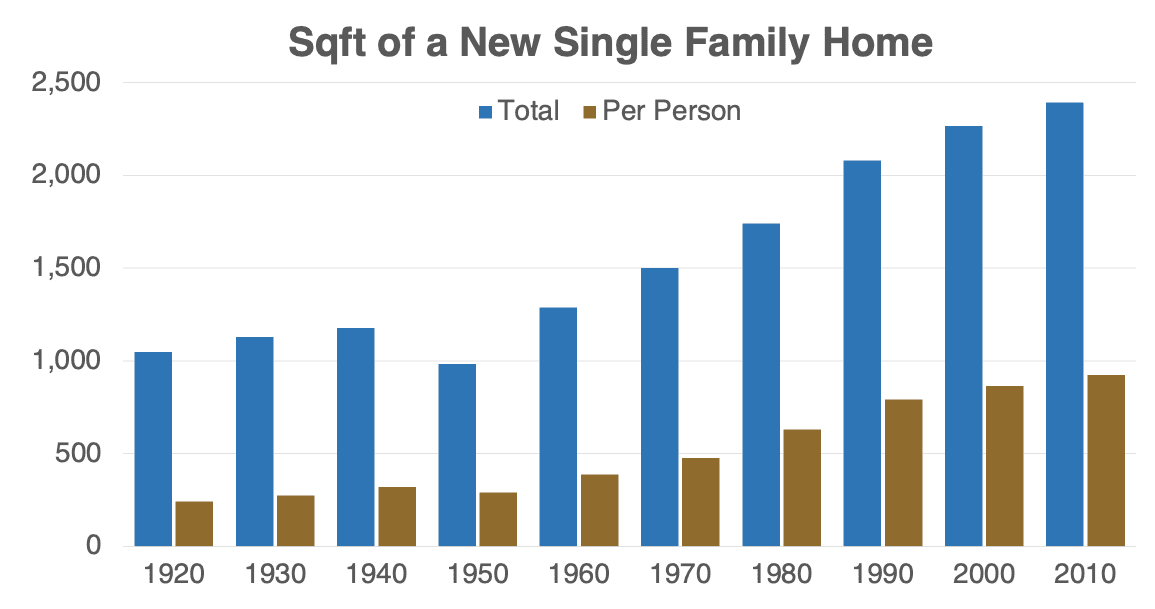By James Furlo on
Why Affordable Housing Is So Hard To Solve, Here's How To Solve It

According to Maslow's hierarchy of needs, shelter is a basic need like air, water, food, and clothing. Therefore, as a society, we should strive to give everyone a chance to meet those needs.
Providing affordable housing for everyone - not just HUD's limited rental assistance - seems like something the wealthiest nation in the world should be able to do. But it's not currently doable for many complicated, multidimensional, dynamic reasons.
Direct and Indirect Building Costs Are Increasing
The cost of materials, building permits, and building requirements have increased. And it's a multiplier effect: more requirements = more time and materials (both of which cost more) to do right.
And let's not forget about indirect costs like transportation and food. Fuel costs are higher, and so are the vehicles to get to the job site.
To be clear, I'm not saying all of these are bad. For example, some building requirements are great! There's a trade-off; as a culture, we've decided to prioritize safety and comfort over price.
All of these factors increase the price of a new or remodeled home. So, simply building more homes doesn't fix the affordability problem.
I mean, it's possible to do in 20 years if housing starts can outpace population growth, but that's incredibly hard to do. Of course, overbuilding can also create a new housing crisis with crashing real estate prices (and environmental issues). As a real estate investor, I don't love that idea, but maybe that's what's best for society in the long term.
We Like Our Space
While the US population has increased, the average household size has decreased . In 1960, there was an average of 3.33 people per household, but in 2020, it fell to 2.53 people per household. And those trends accelerated during the pandemic.
Furthermore, we're demanding larger homes. Here's the current trend :

I talked with a builder of a new housing development a few years ago, and I asked why they weren't putting solar panels on every new home. He responded, "Each home is built to suit, and we give that as an option. 100% of the time, people choose to have an extra 500 square feet instead of solar. We design the roofs to be solar-ready, but people would rather pay for space than renewable electricity."
If we demand smaller, more efficient homes, builders will do it.
But we don't, making it that much harder to keep houses affordable.
Unprofessional Landlords Don't Help
To make matters worse, instead of helping the situation, many landlords are making it worse by seeking the highest possible rent for the least acceptable quality and condition. They get away with it because there simply aren't enough places for people - tenants don't have a choice.
For example, where I live, I get 10-15 applications within 4 hours of posting a rental because fewer than 10 similarly sized places are available.
I once had a lady touring a property who brought her dad (I advise all females to bring someone along, so everyone feels safe). He started nitpicking everything in the 1930s apartment. Yes, it's old and vintage, but everything worked and was in good condition. Eventually, his daughter pleaded with him to stop, "Dad, this is the only apartment available in the city at my price range. I don't have a choice." I shrugged my shoulders in agreement - I had 8 other qualified applicants ready to go. What's my incentive to do better or charge less when I have, in effect, a monopoly in the market?
Layer on top of that mom-and-pop landlords who don't learn the required professional skills (like screening for people with enough income, or returning calls on time), and it's no wonder people question if it's morally right to profit off a basic need like housing.
Solution: Landlord Skills Class
I tend to favor rules that promote personal freedom coupled with personal responsibility. I believe that provides the best environment for people to thrive. But guardrails are also necessary, especially for the neediest in society. So, maybe there should be an education/license or home inspection requirement to become a landlord. This will add a massive time and expense to everyone, which doesn't directly help affordable housing, but it could improve the experience of tenants.
For example, you must hold a license to manage someone else's property in Oregon. Getting your license requires taking classes on tenant-landlord laws, including fair housing and discrimination laws. It's not the most exciting part of investing, but it's important.
For another example, before getting your motorcycle endorsement in Oregon, you must take a 2-day class that teaches you how to ride and pass a skills test. A state-approved private company runs the classes. I could easily see a requirement like this for each landlord.
You'll still have people undermining these regulations, but something like this could dramatically reduce the number of unprofessional landlords.
Rent Caps Don't Work
Rent caps have historically failed to control costs. Oregon instituted rent caps in 2019. But, the average rent increased by 46% in 2022 , above the national average. Wait, how does that work? Let me explain:
When rent caps started, construction projects slowed down, reducing inventory. As I mentioned, I get at least 10 applicants within the first 4 hours when I post a rental. It's kind of crazy. When supply exceeds demand by that much, I can almost set my price to anything I want. Apparently, 46% higher, on average (probably more, since that statistic includes people who didn't move).
And anyone who doesn't move gets the maximum allowable rent increase. What are they going to do? Move? If they can find a vacancy (they can't), they'll pay waaay more than the rent increase.
I'm not saying it's right (I didn't increase any of mine by 46%), but that's what's happening. Rent caps made the housing situation worse, not better. It's a perfect example of unintended consequences. Lawmakers assumed a static housing market, but it's dynamic.
I suppose lawmakers could create a law that caps rent increases between tenants. That sounds like an enforcement nightmare, but more importantly, that dramatically reduces everyone's incentive to repair and improve a rental.
What About Expanding HUD Rental Assistance Payments?
In the book Evicted , Matthew Desmond advocates significantly increasing HUD's budget. That way, more people can get financial help (a rent subsidy), and investors are still incentivized to build and improve their units. I, obviously, like how that sounds, but there's an almost certainty that rents will skyrocket the same way college tuition and health care costs have.
I have a hunch it will help in the short term, but over time, investors will consolidate into massive nationwide companies. Then, they'll use their massive portfolios as rent comps to further drive up rents.
And even though the US is monetarily sovereign, the money has to come from somewhere.
Solution: Technological Improvements
In my opinion, the only thing that will make housing sustainably more affordable will come from technological improvements that, in absolute terms, decrease the cost of living. I see four areas ripe for improvement:
Transactions
Transaction costs are ~12% of a purchase price and are long/complicated (not to mention the physical cost of moving). Technology improvement could drive those costs to almost zero and make them happen as easily as buying on Amazon.
For example, tools like AI - for contracts and accessing a home's condition - and the Blockchain - for tracking ownership and funds - could help speed up and standardize transactions.
These could also make it easier for tenants to vote with their wallets and feet by making moving easier. Right now, switching costs are too high to do easily.
Construction
Building using robotics and additive manufacturing could allow for cheaper/faster/more efficient construction. As a culture, we like to have unique homes, but if we didn't, it would make this transition fast!
But these also create new problems, such as reducing the number of well-paying jobs. But that's been happening throughout history, and like the personal computer, I hope they create more jobs than were replaced.
Transportation and Communication
Self-driving cars, or VR, would make it easier to live farther away, increasing the supply of usable land. Right now, large cities tend to be next to a water source, but what if that didn't have to happen? What if big cities could be anywhere because it's easy to get everywhere?
There are huge societal implications with changes like these. And likely a lot of unintended consequences I'm not imaginative enough to think of.
Farming
We use a lot (a lot!) of land to grow crops. Innovations like vertical farming in warehouses are one possible solution. Stacking plans vertically with automated climate/water control allows food to grow in a much smaller footprint. Plus, they can be closer to cities and reduce delivery costs.
It's not perfect and not nearly as cheap to start, but it can go a long way to increase the amount of usable land.
Taking Action Today
Markets are dynamic, and we'll never reach a perfect equilibrium. If we push for too much change in one area, it'll cause a problem elsewhere. So, only trying to change affordable housing through regulation won't work. Unfortunately, technology solutions will take time to invent and gain adoption.
As for me, there's one thing I can do today to improve the situation: act professionally and provide significant value above and beyond what I charge for rent.
I once had a tenant leave me a long message about a repair. It started normal, but then he worked himself into an uproar that included cussing and name-calling. I was surprised and confused. But instead of calling back and yelling, "You don't get to talk to me that way!" I empathized with his difficult day and told him when we'd fix the issue. Sure enough, he called back, apologized profusely for his behavior, and was easy to work with going forward.
I strive to act with integrity, fairness, and concern for the well-being of others because that's how I want to be treated. And do I make a profit? Absolutely, just like every other business. That's what allows us to create pleasant places to live and have the time to give our residents extra attention.
Do I charge the maximum the market will allow? I do not. That's because I wouldn't like to rent from a landlord who sought the highest possible rent.
It doesn't solve everything, but it's critical to solving the affordable housing problem. As investors, we need to stop trying to maximize our own lives and wealth at the expense of others. Over time, as we put others' needs ahead of our own - and continue to invest in new technology - we'll collectively solve the affordable housing problem.
Let's build your wealth and
improve housing, together
Share what you learned


